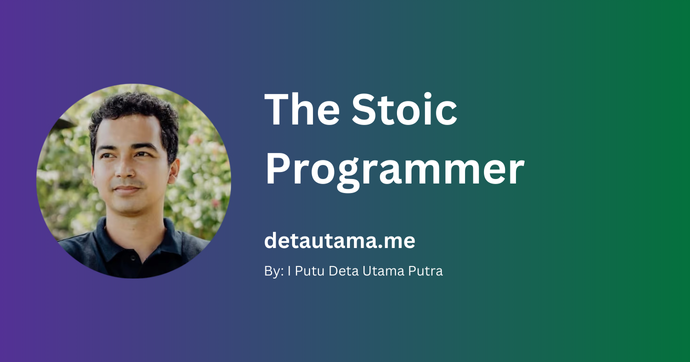In a world of constant deadlines, breaking builds, and shifting requirements, staying calm is a superpower. Enter Stoicism, an ancient philosophy with timeless relevance, especially for programmers.
1. Focus on What You Can Control
“You have power over your mind , not outside events. Realize this, and you will find strength.” , Marcus Aurelius
You can't control client requests, random bugs, or your internet going down. But you can control how you approach the problem, how you write your code, and how you take care of your mind.
In programming:
- You can't avoid bugs, but you can write tests.
- You can’t stop a crashing app, but you can learn from the logs and fix it.
- You can’t control tech trends, but you can keep learning.
When a feature is dropped or the server crashes, remind yourself: “This is outside my control. What’s my best move forward?”
2. Practice Negative Visualization
"He robs present ills of their power who has perceived their coming beforehand." , Seneca
This Stoic habit, premeditatio malorum (premeditation of evils), is about imagining worst-case scenarios to be mentally prepared.
In code, this means:
- Writing tests for edge cases.
- Handling unexpected input.
- Coding for failures: API timeouts, null responses, broken images.
Instead of assuming everything works perfectly, ask: “What if this fails?” Thinking this way creates resilience, in your system and in your mindset.
3. Amor Fati – Love the Process
“Not merely bear what is necessary, still less conceal it… but love it.” , Nietzsche
Amor Fati means "love of fate." It’s about embracing everything that happens, even the hard or frustrating parts.
As a developer, that could mean:
- Refactoring old, messy code.
- Rewriting something because of new requirements.
- Helping a teammate for the fifth time with the same issue.
Rather than resist, embrace these moments. See them as part of your growth.
4. Memento Mori: Deadlines Are Real
Memento Mori reminds us: we won’t be here forever. That includes our time on any project or piece of code.
This perspective helps you:
- Avoid getting stuck in perfectionism.
- Ship value, not just beautiful abstractions.
- Prioritize clarity and results.
Don't wait for the “perfect” version. Write clean, functional code, and move forward.
5. The Daily Standup as a Stoic Reflection
Stoics journaled daily to reflect on their actions and thoughts. As a developer, your daily standup can be your reflection ritual.
Ask yourself:
- What did I accomplish yesterday?
- What challenges did I face? How did I respond?
- What will I do today to improve?
Outside the standup, even 5 minutes of reflection can help you reset, realign, and grow intentionally.
Final Thoughts
You don’t need a toga to be a Stoic. Just a terminal, some patience, and a mindset grounded in what matters.
The Stoic Programmer doesn’t fear bugs, deadlines, or unknowns.
They debug their mind first, then the code.
Stay calm. Ship code. Repeat.
